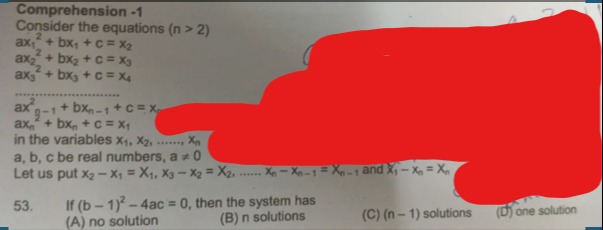Question
Question: Consider the equations (n > 2) $ax_1^2 + bx_1 + c = x_2$ $ax_2^2 + bx_2 + c = x_3$ $ax_3^2 + bx_3...
Consider the equations (n > 2)
ax12+bx1+c=x2
ax22+bx2+c=x3
ax32+bx3+c=x4
...
axn−12+bxn−1+c=xn
axn2+bxn+c=x1
in the variables x1,x2,....,xn
a, b, c be real numbers, a ≠ 0
Let us put x2−x1=X1,x3−x2=X2,......,xn−xn−1=Xn−1 and x1−xn=Xn
If (b−1)2−4ac=0, then the system has

no solution
n solutions
(n-1) solutions
one solution
one solution
Solution
Given the cyclic system
ax12+bx1+c=x2,
ax22+bx2+c=x3,
...
axn−12+bxn−1+c=xn,
axn2+bxn+c=x1,
define the function
f(x)=ax2+bx+c.
Then the system can be written as
f(xi)=xi+1, with xn+1=x1.
A fixed point α of f satisfies
f(α)=α⟹aα2+bx+c=α,
or
aα2+(b−1)α+c=0.
The discriminant of this quadratic is given as
Δ=(b−1)2−4ac.
We are given Δ=0, so the quadratic has a double (unique) solution:
α=2a1−b.
Now, note that for any x,
f(x)−x=a(x−α)2.
Thus for each i:
xi+1−xi=a(xi−α)2.
Summing these differences cyclically gives
∑i=1n(xi+1−xi)=a∑i=1n(xi−α)2.
Since the left-hand side telescopes to 0, we have
a∑i=1n(xi−α)2=0.
Because a=0 and squares are nonnegative, it follows that
xi−α=0 for all i,
or
x1=x2=⋯=xn=α.
Therefore, there is only one solution.
